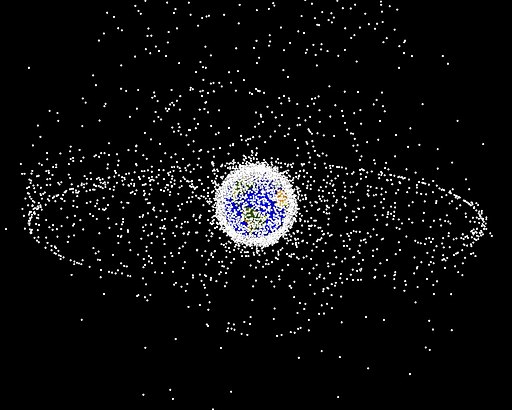Dead satellites and man made space debris orbiting Earth are putting the planet in danger
Recent studies have shown that the volume of dead satellites and man made space debris orbiting Earth are putting our planet Earth in danger.
A recent study by the European Space Agency (ESA) issues a stark warning over the amount of ‘dead’ satellites and man made space debris orbiting Earth.
Three thousand of the 4’500 satellites currently orbiting Earth are dead (non-functioning). Coupled with huge volumes of space debris from jettisoned parts of space craft and space exploration have formed a ‘shell’ around the Earth.
And the director general of the agency said this space debris poses a ‘very big danger’ to the planet.
Speaking at ESA’s ministerial council Head Quarters in Seville, Spain, Johann-Dietrich Worner proposed a mission to deal with “space junk”.
A mission to detect and prevent hazards posed by meteorites was also suggested by the ESA, which said the human race does not want to be wiped out in the same manner as dinosaurs. For years NASA and the ESA have been discussing plans to form a global task force to combat any potential incoming astroids or meteors.
Worner also identified solar flares as a potential danger to Earth which requires the formation of a global defence.
The difficulty lies in the formation of a global cooperation and legal framework to ensure all nations work together and conflicting systems do not hinder the progression of defences and safety of the planet.
Worner said:
“We have a situation of meteorites – the dinosaurs died out because of a meteorite, most probably. We don’t want to be dying out because of a meteorite, and therefore we should have a look to that. And to make two things – to have observations to have early pre-warning, but at the same time… to really fight against it, to have what I call ‘playing billiards in space’, and together with the Americans, we are proposing a mission in that.”
Worner added:
“Then we have the space debris. Space debris, especially from upper stages, from adapters, from old satellites. We have about something like 4’500 satellites in orbit – only 1’500 are active, meaning 3,000 are dead. A very big danger. And therefore we are proposing a mission where we bring down some ESA-owned asset which is still flying around the Earth. And at the same time with the same mission we would also demonstrate that it’s possible to avoid future space debris by doing also some direct de-orbiting.”
Speaking at the opening session of the meeting, Worner said that given today’s technology it would be ‘smart’ to look at bringing samples back from Mars, rather than putting astronauts on the red planet.
“Therefore, we are looking for very a impressive mission, which should get samples back from Mars to have a very direct investigation of the samples here on Earth in our laboratories. This mission looks very simple – you fly to Mars, you get some samples back.”
However he explained it would involve an American rover collecting samples and leaving them in tiny containers on the planet’s surface, to be collected by a European rover once it had moved on to another area.
After finding the samples the European rover would put them in a bigger container and take them to a small launch space where it would be launched into the planet’s orbit.
“And then a European mission will go there, get this container and bring it back to the Earth.”
The councils bring together ESA’s member states and observers every two to three years to decide on new proposals and funding for ESA’s next years of work.
Since you’re here …
… we have a small favour to ask. More people are reading Al-Sahawat Times than ever but advertising revenues across the global media industry are falling fast. And unlike many news organisations, we haven’t put up a total paywall. We want to keep our journalism as open as we can. So you can see why we need to ask for your help. Al-Sahawat Times’ independent, investigative journalism takes a lot of time, money and hard work to produce. But we do it because we believe truly ethical media and an unbias perspective really matters.
“I appreciate there not being a paywall: it is more democratic for the media to be available for all and not a commodity to be purchased by a few. I’m happy to make a contribution so others with less means still have access to information.”
If everyone who reads our reporting, who likes it, helps fund it, the future of ethical media and the futures of our staff and their families would be much more secure. For as little as £1, you can support Al-Sahawat Times and it only takes a minute. Thank you.
This story is available on:
Talk to a journalist
Email: NewsDesk@alsahawat.com
Web: alsahawat.com
Follow Al-Sahawat Times
⬆️ Follow on Instagram
⬆️ Follow on Twitter
⬆️ Follow on LinkedIn
⬆️ Follow on Facebook
⬆️ Follow on YouTube
Read it on FLIPBOARD
Views: 0





